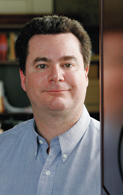Manfredi to take the reins
New Dean of Arts to promote interfaculty research
Chris Manfredi feels like a lucky guy. He's going to take on the deanship of the Faculty of Arts during a time of growth and strength. The after-effects of the budget-squeezed '90s are fading memories, McGill's in the midst of a vigorous faculty renewal and morale is high.

Manfredi researches politics and law.
Owen Egan
Manfredi, a political science professor, has been at McGill since 1988 and is currently in his second three-year term as chair of the Deparment of Political Science. He takes over the arts portfolio from interim dean John Galaty on June 1 for a five-year term.
"A strong and vibrant Faculty of Arts is the core of any great university, and I want McGill to be a great university," Manfredi said during an interview in his light-filled office in the Leacock Building.
His priorities for the faculty include continuing academic renewal and consolidating what the university has reaped. "We need to make sure that young faculty have the resources to succeed in their research and professional careers," he said, wanting to ensure the new blood has lots of mentoring and support. Manfredi also wants to improve research grant acquisition and see those funds transformed into projects.
The university's trend towards interdisciplinarity means he'll further strengthen interfaculty collaboration. His own research has been on the role of the judiciary in democracies, particularly Canada and the U.S., so it's not surprising that the Faculty of Law is one of the first to jump to mind.
"I'd like to see some development in research and teaching of the law and society area, and of society and technology," he said.
Reaching out to other faculties only enhances the intellectual capacity of arts, he believes. Such relationships already exist with the faculties of law, medicine, science and engineering. Manfredi cites examples such as the Institute for Health and Social Policy, the Social Studies of Medicine program and the European Studies program that is jointly run by arts and law.
But it's not all rosy-fingered dawn ahead for Manfredi. The faculty faces some challenges. "The student–faculty ratio is probably too high," he said. "Classroom crowding is an immediate concern for students."
The faculty is already looking into ways to relieve the problem, partly by convincing professors to teach outside the core hours. "Before we start complaining about not having enough space, or the quality of space, we have to use our space more efficiently," he said.
Other student concerns include advising for undergrads, and funding and space for graduate students. "They need places to work and research assistants need space. If we expect our faculty to be productive and train research assistants, we need a place for those research assistants to be," he said.
Which leads us to the question of the whole physical infrastructure. Manfredi admitted this is a "difficult dossier" that he'll need to spend some time on. "There are two issues with the new arts building: where to locate it and how to pay for it. That's in flux."
"It's clear that any new Faculty of Arts building will have to be funded privately, at least for the most part," he said. These aren't issues that can be dealt with easily or soon.
He's also keen on ensuring a good work environment for the administrative staff. "They're in the office five days a week for a full day. They're tied to their desks in a way that the teaching faculty aren't," he said.
The downsizing that occurred during the tapped-out '90s put a lot of pressure on those who keep the faculty's administrative side running smoothly. Sure, more money and space would help, "but maybe there are more efficient ways of doing things, too," Manfredi said. For example, putting student evaluations online reduced the taskload for everyone. Manfredi plans to delve into "why we do things - the nuts and bolts - and starting to think creatively about how we might do them better."
Although he's looking forward to this job, he's aware that the faculty is entering a period of budgetary uncertainty, which may lead to hard choices. But overall, he declared, "I'm just looking forward to the job and the challenge."

